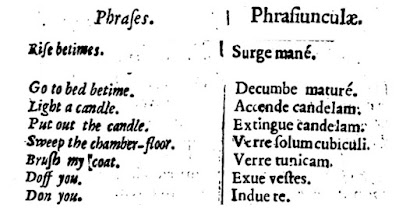A coward to the last?
Messalina, the wife of Claudius, has a tawdry affair with
Silius which goes way too far and is a flagrant challenge to the authority of
the Emperor. The affair is exposed:
In the meanwhile, not rumour only but messengers were
hurrying in from all quarters, charged with the news that Claudius knew all and
was on the way, hot for revenge.
She takes refuge in the Gardens of Lucullus. As the Roman
historian Tacitus recounts the events, he tears her to pieces:
Life was over and done; and all that could be attempted
was decency in death. But honour had no place in that lust-corrupted soul, and
tears and lamentations were being prolonged in vain, when the door was driven
in by the onrush of the new-comers, and over her stood the tribune in silence,
and the freedman upbraiding her with a stream of slavish insults.
Now for the first time she saw her situation as it was,
and took hold of the steel. In her agitation, she was applying it without
result to her throat and again to her breast, when the tribune ran her through.
The grand finale of a string of offences against the Emperor
is the worst of offences – the inability honourably to take one’s own life. And
so the tribune does it for her.
If Tacitus didn’t like somebody, he made sure his readers
knew.
Read all about it [from Paragraph 26 onwards]:
https://penelope.uchicago.edu/.../Tacitus/Annals/11b*.html
One of the principal aims of learning Latin is to read the
poetry, plays, letters, speeches and historical narratives of some of the
greatest writers who ever lived. And when you finally complete a text in Latin,
you deserve a pat on the back because, to get there properly, can be tough
work. That, however, doesn’t prevent you at the outset from reading the works
in English to familiarise yourself with the content, the people and the main
events.
This is just a piece of advice from my own personal
experience. When I started, I knew virtually nothing about the Romans, I picked
up a copy of the Annals by the historian Tacitus, read the first page … and put
it back on the shelf. It was too long and too involved, there were too many
names and, to be honest, I couldn’t put timelines to events or identify what
was of real importance and what wasn’t.
Understanding the Romans, just like understanding their
language, takes a lot of time. In the end I began – in English - with Pliny’s
two letters that recount the events surrounding the eruption of Vesuvius. That
interested me and I could contextualise it because I had been to Pompeii.
They’re short, easy to read and not only do they give you an insight into what
happened, they also tell you quite a lot about the motivation of the man who
wrote them.
Here is a link to both letters in English (6.16 and 6.20)
https://www.yorku.ca/pswarney/2100/pliny-6-16-20.htm
The poet Catullus – although his language can be “raunchy”
and sometimes downright obscene gives us access to the mentality and emotions
of one man, not somebody who is waxing lyrical about ancient heroes and
victories in battles, but who describes the world that orbits him, the people
around him and his, at times, tempestuous relationships with them.
https://www.poetryintranslation.com/PITBR/Latin/Catullus.php
Another way of cherry picking Roman literature is to look at
the UK A and AS Level examination sites; they list works in which the students
will be examined. However, they are never examined in the entire, often very
lengthy text, but rather selections from them i.e. those parts which the
examiners consider to be particularly relevant. When I took a look through
that, and found the Tacitus extracts, I then took the book back off the shelf
and read those. The UK syllabuses are available at:
https://www.ocr.org.uk/.../as.../latin-h043-h443-from-2016/
Similarly, the UK GCSE Latin examinations – for the
16-year-olds – also have some fantastic downloadable material based on
different aspects of Roman life. These contain excerpts in Latin with the
translations. Here is a link to one, but the whole site is worth exploring:
https://www.exams.cambridgescp.com/.../eduqas-component...
I know too that the AP Latin examination from the US will
also list specific parts of the literature which include Vergil and Caesar.
Here are a few others:
Gallic Wars (Caesar):
https://penelope.uchicago.edu/.../Gallic_War/home.html
Civil Wars (Caesar):
https://penelope.uchicago.edu/.../Civil_Wars/home.html
Letters to Friends (Cicero); in Latin and English:
https://archive.org/.../letterstohisfrie.../page/92/mode/2up
Letters to Atticus (Caesar); in Latin and English:
https://archive.org/.../letterstoatticu.../page/156/mode/2up
Epistles (Horace):
https://www.poetryintranslation.com/.../HoraceEpistlesBkI...
Epigrams (Martial):
https://topostext.org/work/677
Over the next few posts, we’re going to start looking at one
of the “keys” to unlock Latin literature, namely the past tenses. As usual,
these texts will be posted with vocabulary and notes and then more details on
the points of grammar. However, I will also put a translation in the comments
section, but you should try to grasp the Latin before you look there!
It took me over two years before I finally embarked on full-scale texts in Latin, but I was pleased when, having eventually read Pliny's Vesuvius letters in the original language, I thought to myself "I'm not sure he's telling the whole truth."















